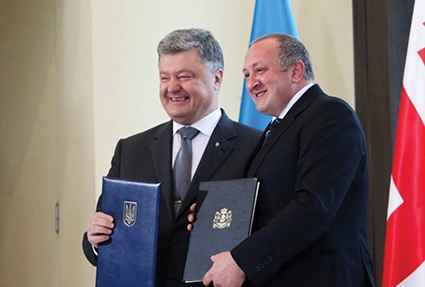United Efforts & Division at Home
On July 17, Ukraine’s president, Petro Poroshenko, began his visit to Georgia, the first such occasion since his election as the head of Ukraine. Poroshenko held meetings with his Georgian counterpart, the PM and other high officials. Although throughout recent years the countries have had minor disagreements regarding the participation of former Georgian president Mikhail Saakashvili and his team in Ukraine’s political life, Kiev and Tbilisi now face similar geopolitical challenges and share common foreign policy goals.
As an expression of this, the presidents agreed to coordinate their efforts toward integration into the European Union, although no elaboration was given on how this would happen in practice. A declaration of strategic partnership was also announced and the Georgian president, Giorgi Margvelashvili, told reporters after the talks that the declaration "reflects the real mood of the two nations." He also added that the two countries “agreed to intensify efforts in terms of integration into the European space". From his side, Poroshenko said that Georgia and Ukraine "have to defend [our] sovereignty, territorial integrity, and democracy together."
Indeed, the two states face similar challenges as within the Russia-West standoff over the former Soviet space, Moscow projects its military power into east Ukraine and Georgia’s breakaway territories of Abkhazia and South Ossetia (Samachablo) to limit the countries’ bid for NATO membership. Both Georgia and Ukraine see the need to cooperate in various spheres, from military and economics to intelligence and diplomacy. Moreover, from a strategic point of view, since the two countries have access to the Black Sea, one could envisage intensified naval cooperation to counter, for instance, Russia’s ambitions since the takeover of Crimea in 2014. US or NATO military capabilities, along with constant naval exercises, could help the countries develop this direction.
However, there are numerous constraints put on both countries and it comes down to the availability of military and economic resources. While both countries’ geographic location is certainly an advantage, Ukraine and Georgia have limited military capabilities in comparison with Russia. For instance, there is almost no military side to Georgia’s Black Sea navy. And while Ukraine makes certain progress in developing naval capabilities, it is still not enough to challenge Russia-controlled Crimean bases. This makes any meaningful cooperation between the countries very unlikely in terms of the overall regional military strategy.
Founding a brand new “state”
While Poroshenko was in Georgia an interesting announcement was made by the head of the Donetsk’s self-proclaimed republic, Alexander Zakharchenko, on the establishment of a new “state”: Malorossiya – Little Russia. Zakharchenko said that the new entity would also include the breakaway region of Luhansk and would, at the same time, serve as a historic successor to the failed Ukrainian state with the ultimate goal of incorporating other parts of modern Ukraine.
No clear reason was given for Zakharchenko’s decision. Perhaps it was done to complicate the upcoming Minsk Group negotiations focusing on the east Ukraine conflict. Perhaps it is part of the struggle for resources between the two east Ukraine breakaway territories. Zakharchenko, by proclaiming Donetsk the capital of ‘Malorossiya,’ essentially wants to get hold of Luhansk’s resources and become a primary political actor in the rebellious region. Indeed, as a sign of resistance, the head of Luhansk breakaway territory, Igor Plotnitsky, was quick to announce that his entity “was established as an expression of the people’s will” and that he has no right to take such steps without the people’s opinion.
Yet another reason behind the proclamation could be ideological reasoning, as Zakharchenko essentially wants to highjack the idea of one Ukraine and build a new state.
Of course, rhetoric is one thing but the reality on the ground is different. The announcement drew immediate international criticism, with both the US and the EU expressing concerns. Moreover, somewhat surprisingly, even the Russians were quick to distance themselves from the initiative. Commenting on it, Russia’s chief negotiator in the Contact Group for Settlement of the Crisis in Eastern Ukraine, Boris Gryzlov, said it should not be taken as manifestation of Russia’s stance on the issue.
The lack of support from Moscow makes it highly unrealistic that the idea of ‘Malorossiya’ will be implemented in any meaningful way. However, the announcement showed that although Poroshenko’s visit stressed the idea that Georgia and Ukraine face similar challenges and share common political goals, Ukraine also has an ideological front through which its breakaway territories want to highjack the idea of Ukraine as a state.
Emil Avdaliani












